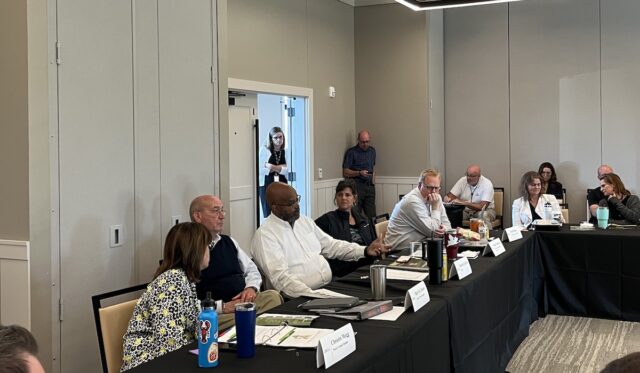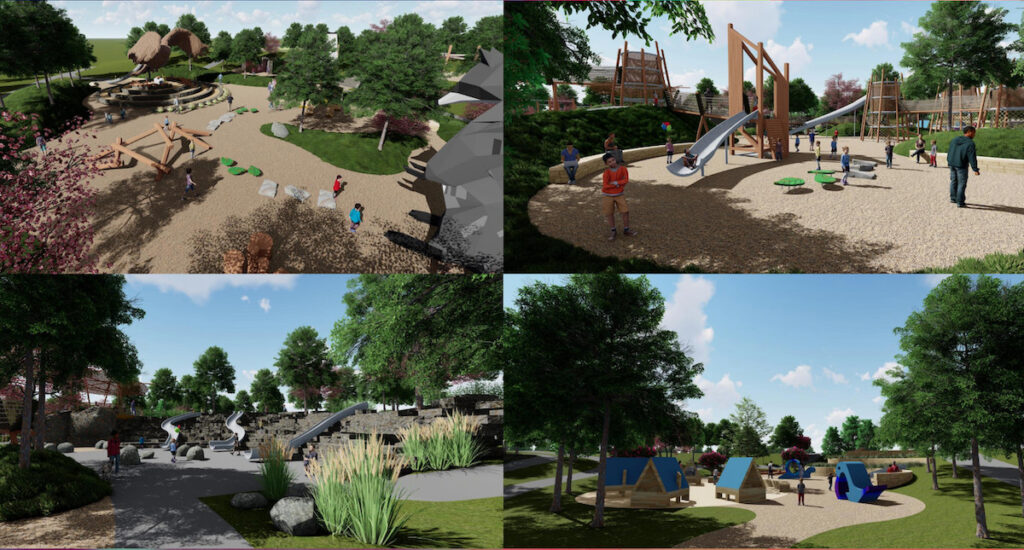
The Edmond City Council and city staff members met to discuss priorities for projects and elections at their annual strategic planning session Tuesday at KickingBird Golf Club, where the six-hour meeting revolved around generating more revenue to fund residents’ growing wants and needs.
During the morning portion of the meeting, city leaders were briefed by bond counsel on the potential impact of calling an election utilizing general obligation bonds to fund road improvement and quality-of-life projects. With sales tax revenues from the city’s 3/4-cent 2000 and 1/2-cent 2017 Capital Improvement Project funds nearly fully obligated for the next several years, city leaders are seeking different revenue sources to fund more projects.
At the meeting, city staff provided members of the Edmond City Council with a 10-year outlook of tax revenue funds dedicated to capital improvement projects, as well as a list of slated projects and their estimated costs. With an estimated $495 million in projects and $158 million in available CIP funds, the document shows an estimated $337 million gap between the two figures:
- Non-utility capital projects totaling $495 million
- $316 million: Mobility (intersection widenings, annual road pavement improvements, Edmond Shift projects (i.e. school safety routes, neighborhood linkages, core network completion);
- $128 million: Quality of life (parks, sports fields, Arcadia Lake master plan);
- $80 million: Maintaining and improving existing facilities (AC Caplinger, Pelican Bay, trails, playground equipment).
- $51 million: Public safety and city facilities;
- $69 million: Total need; $51 million from CIP funds.
- Non-utility capital project estimated funding of $158 million (2000 CIP, 2017 CIP, park tax).
The breakdown includes an assumption that the city’s 1/2-cent 2017 CIP tax would sunset in March 2027 and not be renewed. Additionally, a 1-cent sales tax dedicated to the general fund is also scheduled to sunset at that time. The two taxes generate more than $40 million in tax revenue each year.
Allan Brooks, an attorney with Public Finance Law Group who serves as bond counsel to the city, said losing that amount in tax revenue would be detrimental to the city.
“For that sales tax to drop off, that is a lot more than a dip,” Brooks. “It means not doing projects, cutting city services and raising utility rates dramatically.”
So many elections, so little time
Brooks said the Edmond City Council should be planning election dates for the extension of those taxes, although the city would be required to set different ballot questions for each tax. In 2016, each question was placed on the same ballot and approved.
“We need to be talking about this now, in terms of when you go back to the voters,” Brooks said. “Again, you have got 1.5 percent of your 3.75 (percent) that is set to come off in a little over three years.”
Asked by Stacie Peterson, Ward 4 councilwoman, when the Edmond City Council should bring those questions to voters, Brooks said it’s “not too early.” Barry Moore, Ward 2 councilman, asked when city leaders should consider calling an election to utilize general obligation (GO) bonds.
“Now is a good time. Do you have to do it now? You don’t, but you’re not too early either,” Brooks said. “That’s not really so much a legal question as it is a political question.”
Brooks said renewing the existing sales tax should be the city’s bigger priority.
“Clearly, your biggest issue, in my opinion, if you can weigh one versus the other, you have got to deal with the sales tax,” Brooks said. “That’s an ongoing source of revenue that tends to grow.”
After the presentation from the city’s bond counsel, Moore asked city staff to develop a citizens committee for the purpose of gathering information on an election utilizing general obligation bonds and projects to be funded from them.
“And I also suggest that you do nothing until after the Edmond Public Schools next bond election,” Moore said, referencing an anticipated Feb. 13 EPS bond vote.
Beyond those questions, the city could also ask residents to increase its 4 percent lodging tax, which is levied on overnight stays at hotels or Airbnbs. In November 2022, the Edmond City Council received a recommendation from VisitEdmond to place a question on a 2023 ballot asking Edmond citizens whether to increase the city’s lodging tax to 5.5 percent. However, no action was taken upon the recommendation.
Asked about Tuesday’s discussion on GO bonds and alternative funding sources after the meeting, Edmond city manager Scot Rigby said city leaders had been reminded Tuesday that they have existing funding sources to renew in addition to seeking new ones.
“It was a critical discussion that they needed to have. As much as people focus on alternative funding — which was an important discussion — I think bond counsel and staff reminded everybody in the room that you have some critical existing funding sources that are coming up,” Rigby said.
Edmond City Council members stopped short of indicating what dates might be preferred for any ballot question.
“As (long) as I’ve been here for 10 years, we have never got this deep into our financials,” Mayor Darrell Davis said. “We’re going to unspoken ground.”
Follow NonDoc’s Edmond coverage
‘I don’t think it’s been communicated clearly with the citizens’
During the afternoon portion of Tuesday’s meeting, Edmond City Council members surveyed each item listed on the city’s 2023 strategic plan and decided whether to carry them over to the 2024 plan — marking off projects that have already been completed or do not require further action from council.
On the topic of the commuter rail project proposed by the Regional Transportation Authority of Central Oklahoma, Tom Robins, Ward 1 councilman, asked his fellow council members whether they would like to set a maximum amount of sales tax that RTA could request.
“Given the constraints on the dollars that we just saw, do we want to put a cap on how much we’re willing to accept that they’ll come to us for on sales tax?” he asked.
Davis said he would not give an amount.
“I know the other communities, they don’t want that sales tax amount to be higher. I don’t, but we don’t know what it is,” Davis said.
State law limits RTA, as it can only levy a sales tax within member cities at a maximum rate of 2 percent. No other tax revenue sources can be used to fund the project, which will be largely backed by federal grants. RTA would like to bring the ballot referendum before Edmond, Oklahoma City and Norman voters in fall 2024 or spring 2025.
According to email records made available to NonDoc under the Open Records Act, city staff are in negotiations to acquire property at 24 W. 3rd St. to be used for an RTA railway station. The city may use eminent domain to acquire the property if it cannot come to an agreement with the property owner.
At its Oct. 23 meeting, the Edmond City Council approved moving the CityLink Transfer Center to the city-owned parcel directly east of that property.
During Tuesday’s strategic planning session, Robins asked if a communications component could be added to the budget discussion to “support development of the revised water treatment plant expansion plan.”
The new water treatment plant, intake structure and a wastewater resource recovery facility are projected to cost nearly $500 million altogether. The projects will allow the city to gain water independence from Oklahoma City, where the city purchases water during periods of high demand.
“We have to totally revamp the level of engagement that we’re doing with our citizens on this infrastructure project,” Robins said.
Robins was the only council member to vote against the water and wastewater rate increases approved at the Sept. 11 city council meeting.
Ward 3 Councilwoman Christin Mugg said communication with residents is an issue, but she opposed Robins’ request.
“I can’t support spending money out of a budget that’s limited on PR,” Mugg said. “I don’t want to put it in.”
Robins said he believes better communication efforts with citizens will lead to better outcomes.
“I look at it as our due diligence with the citizens to communicate with them,” Robins said. “I don’t think it’s been clearly communicated to the citizens.”
Moore asked Bill Begley, the city’s marketing and public relations manager, to work with Robins on communication efforts.
“I voted to raise [the rates]. If we were required to, I’d vote again tomorrow if I had to, cause that’s what it takes to get it done,” Moore said. “But let’s just see if we can accommodate what he’s asking for.”
Uncommon Ground Sculpture Park supported in strategic plan

Council members also decided to keep language in the 2024 Edmond strategic plan related to supporting the Uncommon Ground Sculpture Park, a 62-acre park that had been planned for the northwest corner of 2nd Street and North Coltrane Road.
Hal French, an Edmond resident and developer, intended to raise funds privately and philanthropically to build the park and donate it to the city. However, he ultimately decided to end his effort owing to frustrations with city staff, despite the project being approved.
“They haven’t pulled back their applications or anything like that,” Davis said.
Mugg added that there is still funding in the budget to widen Coltrane Road and fix drainage issues on the property, as had been agreed upon by French and the city.
“I’d add a couple stars next to it,” Moore said of the item.
Casey Moore, the city’s director of management services, said the 2024 strategic plan should be completed by the turn of the year.





















